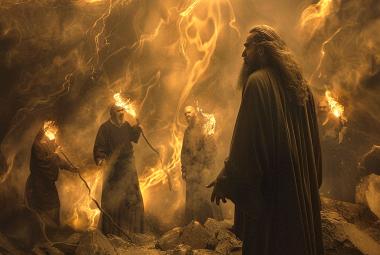We continue to receive mail concerning various schemes that attempt to establish the date for the Rapture of the Church or the Second Coming of Christ. One of the recent examples of this involved Family Radio's Harold Camping, who indicated that Christ would return sometime in September 1994. Some ministries have even misquoted us in this regard.1 Still, many are surprised that there is actually less date setting today than there was 100 to 300 years ago.2
The Bible is filled with admonitions in regards to date setting. The Bible indicates that everything will be established by two or three witnesses (Deuteronomy 19:15; Numbers 35:30; Matthew 18:16; John 8:17; 2 Corinthians 13:1; 1 Timothy 5:19). One would think that these references would be enough, and yet the fascination with date setting continues.
There are a number of provocative conjectures that are interesting to explore casually, such as the Feasts of Moses,3 but there seems to be a strange virus in the air that frequently converts a colorful possibility into a consuming obsession for specific dates.
Our Blessed Expectation
There are several passages that do suggest that the faithful believer will not be caught by surprise (Luke 21:28; Hebrews 10:25; 1 Thessalonians 5:4, and so on). Let us remember that the Lord has called us to be alert (Matthew 24:42; Mark 13:35-37).
"Watch ye therefore: for ye know not when the master of the house cometh, at even, or at midnight, or at the cock crowing, or in the morning: Lest coming suddenly he find you sleeping. And what I say unto you I say unto all, Watch and to ready." Mark 13:35-37.
The Bible teaches that Christ can come at any moment. (This is called the doctrine of imminence.) Any valid date setting would tend to destroy the doctrine of imminence, and would also have a deleterious effect on our Christian walk. We are to live in the expectation of His any-moment appearance for us.
The Signs of the Times
The Bible does, however, describe in surprising detail the scenario of events that will be climaxed by the Second Coming of Christ. Most of these are directly linked to the seven-year period known as the "Seventieth Week of Daniel."4 In fact, this unique period is the most documented period in the Bible. Many of us are convinced that it involves events that occur after the Rapture of the Church. It is because of the ostensible preparations for these events, which are appearing on our horizon, that we can recognize the approach of the end of the church age and the threshold of these post-rapture events.
In fact, it is the convergence of so many of these major prophetic themes that creates this atmosphere of anticipation.
The Times of the Signs
We seem to be plunging into a period of time about which the Bible says more than any other period of time in history--including the time when Jesus walked the shores of the Sea of Galilee and climbed the mountains of Judea. Some of the major themes emerging before us include:
- The Rebuilding of Babylon. The literal destruction of Babylon as a major world center is described in Isaiah 13-14 and Jeremiah 50-51. Since this has not happened yet (as detailed in these passages), it is interesting that Saddam Hussein has now begun what would appear to be a key element in the final climax.
- The Preparations to Rebuild the Temple in Jerusalem. Three times in the New Testament (Matthew 24:15; 2 Thessalonians 2:4; Revelation 11:1,2) there are allusions to the presence of the Temple at the Second Coming. The very presence of Israel in the Land, the regaining of Biblical Jerusalem (the Old City), and now the preparations to rebuild, are all clear, specific indications that the final climax is on the horizon.
- The Rise of the European Superstate. Daniel 2 and 7 describe the final reemergence of the fourth world empire during the end times, so for centuries scholars have looked for a "Revived Roman Empire." This quaint nomenclature nevertheless describes the setting for the establishment of a final world dictator that appears on our horizon with the emergence of the European Superstate and the widespread movement toward a one world government.
- The Magog Invasion. Perhaps the most provocative--and most imminent--event is the impending military incursion into Israel by Russia and an alliance of Islamic nations that is described in Ezekiel 38 and 39. The more one examines this passage and compares it with current intelligence estimates, the more it would appear that it could happen at any moment. (See The Magog Invasion, for a detailed review and update.)
It is exciting, indeed, to see these things begin to take shape on our immediate horizon and to come to grips with the impending reality of Christ's return. But there is a difference between "being ready" and setting dates. One we are strongly and repeatedly admonished to do; the other is expressly prohibited. Further more, there is another danger. I call it "rapture-itis." There is a tragic fatalism that can immobilize the Christian body from truly "occupying" until He comes (Luke 19:13).
We need to continue to be responsible stewards of His blessings--including our unique blessings of this country and its heritage--and also prepare for an uncertain future until He does return for us. There is a tragic and unhealthy tendency for many of us to sit back and assume that the church will be snatched out before the real turmoil begins. The apparent exclusion of the church from that specific period specified as "the" tribulation does not exempt any of us from experiencing the kind of persecution that has burdened most of the body of Christ in most of the world for most of the past two thousand years!
Rather, we should be doing our homework, learning all we can, dispensing with the erroneous and myopic presuppositions of the past and, motivated by the imminent horizon, be focusing on His priorities for the kingdom in the time that remains. That's if we are really serious. Are you sure of your position in Jesus Christ? Deal with that issue immediately. You say you have received His salvation? What are you doing with it?
Notes:
- Misrepresented in "99 Reasons Why No One Knows When Christ Will Return," p. 34, Christian Research Institute, San Juan Capistrano, CA.
- Tommy Ice, Pre-Trib Perspectives, Vol. 1, No. 3, Nov-Dec 1994. Pre-Trib Research Center, 370 L'Enfant Promenade SW, Suite 801, Washington DC, 20024.
- See our Book, The Feasts of Israel, which explores some of the prophetic implications.
- Daniel 9:24-27, highlighted as the key to end-time prophecy by Christ Himself. See our Book The Seventy Weeks of Daniel for a detailed study of this remarkable passage.





